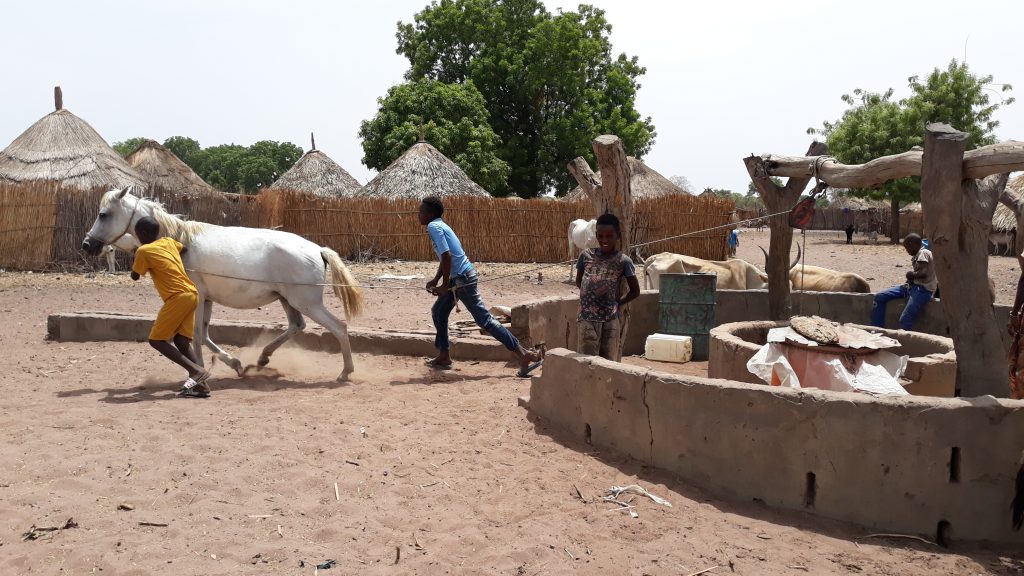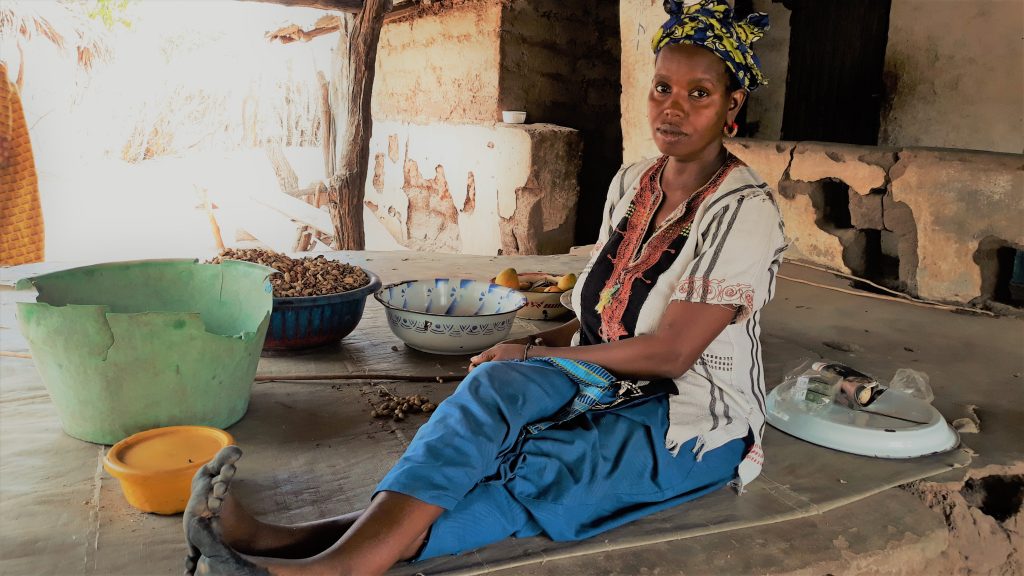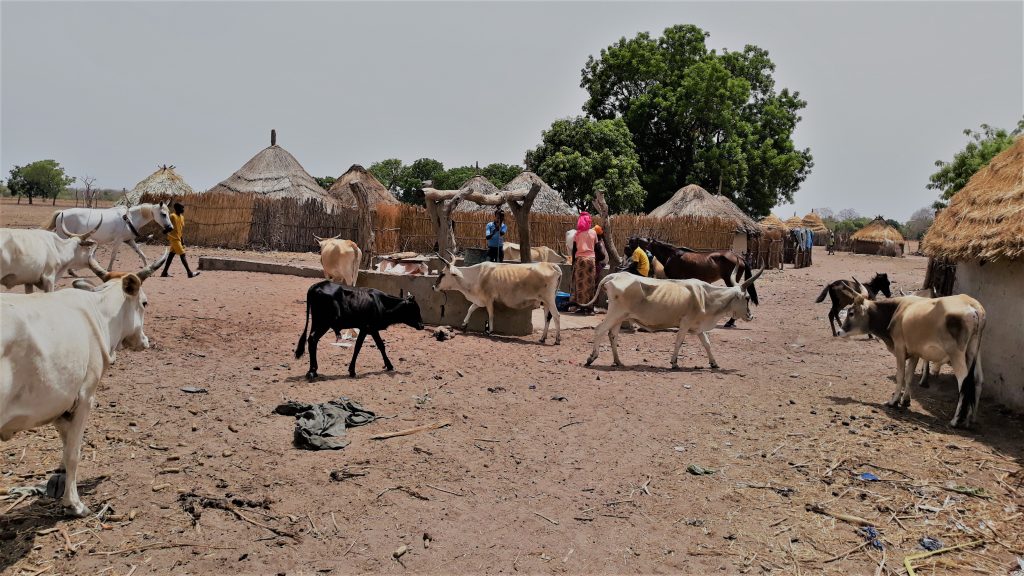This project is made possible through the partnership of WATER CHARITY and the NATIONAL PEACE CORPS ASSOCIATION. ![]()
Location
Fitu-Fula Village, Sami District, Central River Region, The Gambia
Community Description
Fitu-Fula is located in the northern part of the Central River Region along the Lamin Koto-Passamass Northern Trans-Gambia highway about 9 Kilometers from Lamin Koto. The community is composed of predominantly nomadic Fula who settled in the area a century ago after migrating from northern Senegal in search of better grazing land for their livestock. They ended up settling in the Sami District and founding Fitu-Fula, a community of about 300 people, the vast majority of whom cannot read or write and are firmly dependent on subsistence farming.
About half a mile away from Fitu-Fula is a community called Fitu-Wollof. It is a community of about 250 people from the Wollof tribe. They settled in the area well before the people of Fitu-Fula. For the last century, the two communities have lived separately, but in harmony. Both communities depend on subsistence farming—growing groundnut, millet, and maize, primarily for home consumption.
Problem Addressed
Fitu-Fula has two open wells, both very deep and as a result often inaccessible. To deal with the wells’ depths, the community ties a 20-liter bucket to a rope and drives a horse a distance in order to pull water from the depths of the wells.
The entire community depends on these two wells for their survival. However, the wells dry out quickly during the dry season (6 months from December-May), forcing the villagers to travel 9 kilometers away to Lamen Koto to fetch water. Some households use ox carts, while others use donkey carts or horse carts. For much poorer households, they walk the distance just to procure drinking water for their family, leaving the need for water for domestic purposes unfulfilled. By the time they collect 60 liters of water for drinking, they are already exhausted and cannot return that day for more.
The community has been facing this severe water shortage for many years. Most people spend a whole day trying to procure water, and women and girls face the harsh brunt of the crisis. According to the village health worker, access to water is very difficult and the water from both wells is not suitable for drinking as it is often infested with microbes, causing diseases, especially in children. The chronic water shortage has seriously affected girls’ education, as most of them cut classes to fetch water for their parents’ household uses.
Fitu-Wollof is facing similar issues. They have two open wells and, because the water table in the area is extremely deep, access to water is toilsome and frustrating. Women and girls frequently complain of chest pain and general fatigue from spending time pulling water from the excessively deep wells. Long queues and quarrels often lead to full-blown fights.
Project Description
This project is to build a solar-powered water pumping, storage, and distribution system.
The community of Fitu-Fula managed to dig a borehole a few years ago but was unable to fund the setting up of a tap water system. The borehole needs dewatering. After dewatering, a new Grundfos high-quality solar power submersible pump will be installed.
A 6-meter high concrete tower will be erected with a 5,000-liter triple-layer polyethylene water tank mounted on top. Piping will be laid to provide 4 taps for the community of Fitu-Fula, and further piping will be laid to provide 2 taps for the community of Fitu-Wollof. These two communities will be clustered into one main water source, which will provide ample safe drinking water for both.
The current open wells in both communities (one in each) will be further developed for non-drinking purposes, and a water trough will be built to water livestock without contamination by feces. Women will be able to use these remaining open wells to water their household vegetable gardens, creating income for the women, and allowing girls to stay in school.
The communities of Fitu-Fula and Fitu-Wollof will jointly provide solar panels, gravel, sand, cement, iron rods, digging of trenches and the making of the concrete tower as their contribution towards the project. Any needed manual labor will also be provided by them. They will also host and feed the workers.
Water Charity funds will be used to purchase materials and pay for skilled labor.
Project Impact
This project will benefit 550 people in two communities.
Project Administration
Emily Lundberg, Ph.D., Water Charity Country Director – The Gambia, working with Mike McConnell, Managing Trustee of GambiaRising and former Country Director for Peace Corps in The Gambia, and Ebrima Marong, Water Charity Program Manager.
Monitoring and Maintenance
A five-member water management committee has been set up headed by Mr. Yaya Jallow and Deputy Mrs. Ramata Jallow. The committee consists of serious and dedicated people chosen by both villages in a meeting held at the Fitu-Fula village ‘Bantaba’ (meeting place). The selection of the committee members was gender-balanced. Since women bear the brunt of water collection in households, they should have a say when it comes to water management issues.
A training workshop will be conducted for them on community management model techniques to ensure sustainability. It was strongly agreed at the same meeting that at the end of every month, each household will pay some amount and a bank account will be opened by the water committee, with three mandatory signatories, where the collected amount will be saved for future maintenance and repair or for any future upgrades.
To be completely transparent, the committee will report monthly on the state of the water system and of the bank account to the villagers at the village Bantaba, to be coordinated by the Alkalo (village head). Through this mechanism, the community will have a sense of ownership and responsibility toward the upkeep of the water source, thus ensuring sustainability. This committee is made up of three members from Fitu-Fula and two from Fitu-Wollof. They will jointly oversee the smooth running of the water system.
For sustainability purposes, a three-man technical team has also been set up to be trained on water system maintenance upon completion. They are to oversee the effective and smooth operation of the solar power system and regular cleaning of the solar panels. They will be trained by the contractor on how to take care of the solar-powered water system and how to report to them if a problem arises, as the contractor has granted us a warranty period.
Water Charity Program Manager Ebrima Marong will visit the community regularly to check whether the system is working accordingly, as well as check that the water management committee is working effectively.
Project Conclusion:
For both communities to share, we built a solar-powered water pumping, storage, and distribution system. As always, we installed a Grundfos high-quality solar power submersible pump. We built a 6-meter high concrete tower mounted with a 5,000-liter triple-layer polyethylene water tank, and laid piping for 4 taps for Fitu-Fula and 2 taps for Fitu Wollof.
Check out a short movie showing the Project’s completion:


